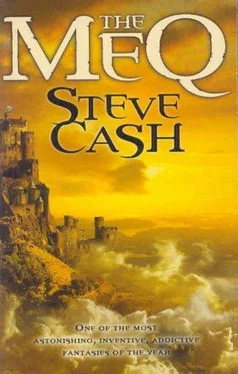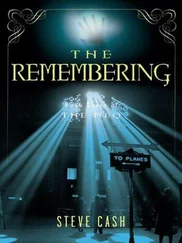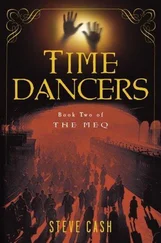Steve Cash - The Meq
Здесь есть возможность читать онлайн «Steve Cash - The Meq» весь текст электронной книги совершенно бесплатно (целиком полную версию без сокращений). В некоторых случаях можно слушать аудио, скачать через торрент в формате fb2 и присутствует краткое содержание. Год выпуска: 2005, Издательство: Del Rey, Жанр: Фэнтези, Детективная фантастика, ya, на английском языке. Описание произведения, (предисловие) а так же отзывы посетителей доступны на портале библиотеки ЛибКат.
- Название:The Meq
- Автор:
- Издательство:Del Rey
- Жанр:
- Год:2005
- ISBN:нет данных
- Рейтинг книги:4 / 5. Голосов: 1
-
Избранное:Добавить в избранное
- Отзывы:
-
Ваша оценка:
- 80
- 1
- 2
- 3
- 4
- 5
The Meq: краткое содержание, описание и аннотация
Предлагаем к чтению аннотацию, описание, краткое содержание или предисловие (зависит от того, что написал сам автор книги «The Meq»). Если вы не нашли необходимую информацию о книге — напишите в комментариях, мы постараемся отыскать её.
The Meq — читать онлайн бесплатно полную книгу (весь текст) целиком
Ниже представлен текст книги, разбитый по страницам. Система сохранения места последней прочитанной страницы, позволяет с удобством читать онлайн бесплатно книгу «The Meq», без необходимости каждый раз заново искать на чём Вы остановились. Поставьте закладку, и сможете в любой момент перейти на страницу, на которой закончили чтение.
Интервал:
Закладка:
Our destination was the sacred Taoist mountain of Hua Shan in the province of Shensi. Sailor said it was a good place to start because of its inaccessibility. Zeru-Meq loved impossible places, he said, especially places as contradictory as Hua Shan. The mountain had been held sacred in China since very early times and often appeared as a backdrop in scrolls because of its spirituality and isolation. It was a trip which by junk, train, and donkey should have taken no more than a month. It took us three. One step forward, two steps back. China.
Hua Shan lies to the east of the ancient city of Sian and looms over the Yellow River and the narrow valley below it. It is surrounded by the Tsing Ling mountain range and the mountains of Shansi to the north. Hua Shan itself is a jagged circle of sharp peaks around a patchwork of flat land and small plots. It is beautiful and dangerous, foreboding and inviting all at the same time. The peaks rise two to three thousand feet and are very steep. It seemed ironic but fitting that the last leg of our difficult journey was a short and easy train ride to the nearby hamlet of Hua Yin, which means “under the shadow of Hua Shan.” Along the way, I thought of Zeru-Meq and what Geaxi and Sailor had told me about him.
Born premature in 356 BC, the same year as Alexander the Great, he was so tiny his papa could literally hold him in the palm of his hand. He was Egipurdiko and his family were fishermen and gamblers in equal parts. They were known but rarely seen in every thriving port of the western Mediterranean. Most of them died or were killed in a violent manner, some even taking their own lives, a phenomenon Sailor said was unique to the “diko.” Zeru-Meq and his sister, Hilargi, were eventually left with no one but themselves and traveled together, surviving that way for more than a century. Then, when Hannibal, the Carthaginian, was making his ill-fated march toward Rome, they joined his armies and entourage, becoming elephant handlers. During Hannibal’s retreat to North Africa, according to Geaxi, they both met their Ameq and Hilargi crossed in the Zeharkatu, but Zeru-Meq did not. The reason has never been known. Eventually, Xanti, the Fleur-du-Mal, was born to Hilargi in a ruined village somewhere in North Africa. They were staying as far away as they could from the murdering Romans, who were killing anything or anyone associated with Hannibal. After that, something happened. It has never been explained, but Zeru-Meq appeared in what is now Barcelona with the infant Xanti, saying Hilargi and the father were dead. He handed Xanti over to an old Basque family that had once done business with him and returned to North Africa, disappearing for the next few centuries in the deserts and mountains. Sailor said that since then Zeru-Meq had had so little contact with other Meq you could count the occasions on one hand. It was known he first went to China with Marco Polo in the thirteenth century after coming out of the African desert with a strange passion for all things mystical in Giza religions. He stayed in China, seeking out the old Taoist poets and mystics, which he does to this day. Geaxi said he knew of Opari and our search for her. However, it might not matter. He thought the Remembering and the Meq themselves were insignificant and irrelevant. She said that was why they had not sought Zeru-Meq before; even if they did find him, he might decide not to help. But, she added, now we had no choice. The Fleur-du-Mal himself had made it so.
We walked the fairly short distance from the station to the Jade Spring Temple, which was the start of the ascent of the mountain. Our long robes and hats were dirty and worn and we truly looked like three tired and road-weary pilgrims. Geaxi asked the monks who greeted us if there was a head priest we could have counsel with and ask a very private question. They were cordial and did not treat us as children at all, but as equal seekers of an immutable truth, even though we were Western and dressed as Buddhists. They told us there was no head priest, but five priests had permanent residence on the North Peak. They would be the ones to ask.
The way up the mountain took most of the rest of the day. At one point, it was so steep that the path led up nearly perpendicular rock faces in which steps had been hand-cut and iron chains were set in rock to provide handholds.
Finally, we emerged on the North Peak, which was really a knife-edged ridge with a few temple buildings and a monastery perched on top. The ridge was so narrow that the path had to pass through the buildings, with no room on either side. From the ridge I took my first full view of the plain below, the mountains of Shansi in the background and the great Yellow River flowing in between. All around were daggerlike pinnacles and rock walls, the whole scene continually changing through the dance of sunlight and drifting mist.
Walking slowly, we started toward the monastery. We passed a monk sitting on his haunches and painting an elaborate rendering of a Chinese character on a scroll. I asked Geaxi what the character meant and she said “shou,” or longevity. I was nervous with energy. I wondered inside what Zeru-Meq might be like.
The monastery itself was a simple stone structure with a steeply angled tile roof. Two twisted and gnarled pine trees somehow clung to the ridge beside it and hung suspended over a three-thousand-foot chasm. There was no one inside except a boy about our size sitting by an altar. He had his back turned to us, but we all knew he was not Zeru-Meq. We walked through an open door at the other end and there, sitting cross-legged on a rounded boulder against a background of clouds and mist, were five Taoist priests. They wore full-length blue-black robes and small four-cornered caps set back high on their foreheads. They each held a fly whisk in their hands. Their expressions were indifferent, but the one in the middle motioned for us to approach, as if he had been expecting us.
Sailor stepped forward and spoke to him in Chinese. He introduced himself and told him it was an honor to visit the mountain and thanked him for receiving us. The priest said it was indeed their honor to receive pilgrims who had come so far and then they spoke of the monastery and Sailor asked about the boy we had seen inside. The priest said the boy had been sent there from Shanghai by his parents for the benefit of his health. Just then, I saw the boy appear out of the corner of my eye and take a seat behind and to the side of the priests. Sailor went on to ask the middle priest if he knew of another boy, one that looked like us, with the name Zeru-Meq. The priest shook his head, but at the mention of the name, for just an instant, I saw the boy smile. Sailor thanked them all again and we turned to leave, bowing first to show respect. As we walked back through the monastery, I glanced at Geaxi to see if she had seen what I had. She nodded.
Once we were out of sight and sound of the monastery and were about to make our descent, the boy appeared again. Geaxi spoke to him. He said he knew the one we asked about and that Zeru-Meq had taught him to play cards and even written a poem while he was there, carving it in a pine tree. He took us to the tree and there it was, recently carved and in Chinese. Geaxi translated. It said, “Time is only fire and spark knocked off flint. Let’s play.”
Sailor asked the boy when Zeru-Meq had been there and the boy said we had just missed him. He had been there the day before yesterday. I was confused. The five priests had told us they had no knowledge of him. Sailor looked at Geaxi and then at me. “I was afraid of this,” he said.
And so it was. We set out on a trail that followed whispers, rumors, intimations, and outright lies. We eventually made pilgrimages to all of the eight remaining sacred mountains in China. We were delayed for weeks and months at a time by floods, mudslides, tornadoes, and snowstorms. We were forced to make detours again and again by washed-out bridges, transportation strikes, misinformation, and the overall chaos of a changing and disintegrating empire. I often thought of the old inscription on the stone anchor post I’d found on the Yangtze and how true it was — it is nothing to disappear in China.
Читать дальшеИнтервал:
Закладка:
Похожие книги на «The Meq»
Представляем Вашему вниманию похожие книги на «The Meq» списком для выбора. Мы отобрали схожую по названию и смыслу литературу в надежде предоставить читателям больше вариантов отыскать новые, интересные, ещё непрочитанные произведения.
Обсуждение, отзывы о книге «The Meq» и просто собственные мнения читателей. Оставьте ваши комментарии, напишите, что Вы думаете о произведении, его смысле или главных героях. Укажите что конкретно понравилось, а что нет, и почему Вы так считаете.












